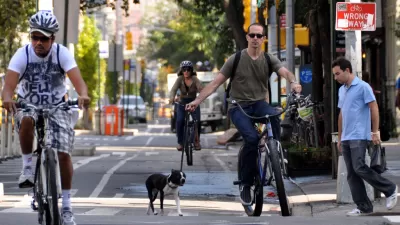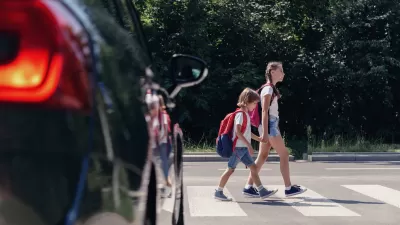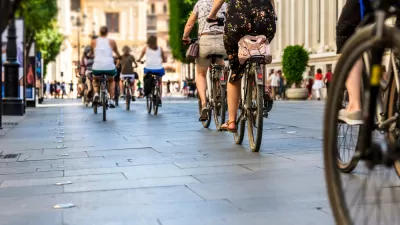The age-old conflict between cars and bikes finally has the attention of one of the giants. Ford's Info Cycle project mounts sensors on street bikes to map out how multi-modal city travelers move around.

You know multi-modal alternatives are catching on when Ford steps into the ring. "More than a century after Ford itself fatally disrupted the horse carriage industry, the people at the prototypical 20th-century manufacturing company are confronting a proliferation of 21st-century alternatives to the old paradigm of one person, one car, in which simply pushing new models off assembly lines each year won't cut it."
Developed in Palo Alto, Ford's Info Cycle project uses a sensor system to gather bicycle movement data, "along with OpenXC data gathered from its cars, to track the changing way people are moving around cities." Mounted on a whole fleet of bikes, "the sensor is capable of recording a variety of data, including location, pedal speed, ambient light, temperature, altitude, and speed. The data is then available for analysis."
In addition to providing insight for Ford, the data collected could aid street design to improve safety and usability. As of right now, Ford appears to view the project as a study in the kind of disruptive innovation many 20th-century behemoths have fallen prey to.
Says Sudipto Aich, a principal research engineer for Info Cycle, "Ask anyone who rides in the city the top thing they are mindful of, it's a car [...] that in itself is potentially a huge opportunity. Now, bike companies aren't thinking about cars, and car companies aren't thinking about bikes."
FULL STORY: Ford Tries to Figure Out Bicycles

Planetizen Federal Action Tracker
A weekly monitor of how Trump’s orders and actions are impacting planners and planning in America.

Congressman Proposes Bill to Rename DC Metro “Trump Train”
The Make Autorail Great Again Act would withhold federal funding to the system until the Washington Metropolitan Area Transit Authority (WMATA), rebrands as the Washington Metropolitan Authority for Greater Access (WMAGA).

The Simple Legislative Tool Transforming Vacant Downtowns
In California, Michigan and Georgia, an easy win is bringing dollars — and delight — back to city centers.

The States Losing Rural Delivery Rooms at an Alarming Pace
In some states, as few as 9% of rural hospitals still deliver babies. As a result, rising pre-term births, no adequate pre-term care and "harrowing" close calls are a growing reality.

The Small South Asian Republic Going all in on EVs
Thanks to one simple policy change less than five years ago, 65% of new cars in this Himalayan country are now electric.

DC Backpedals on Bike Lane Protection, Swaps Barriers for Paint
Citing aesthetic concerns, the city is removing the concrete barriers and flexposts that once separated Arizona Avenue cyclists from motor vehicles.
Urban Design for Planners 1: Software Tools
This six-course series explores essential urban design concepts using open source software and equips planners with the tools they need to participate fully in the urban design process.
Planning for Universal Design
Learn the tools for implementing Universal Design in planning regulations.
Smith Gee Studio
City of Charlotte
City of Camden Redevelopment Agency
City of Astoria
Transportation Research & Education Center (TREC) at Portland State University
US High Speed Rail Association
City of Camden Redevelopment Agency
Municipality of Princeton (NJ)





























